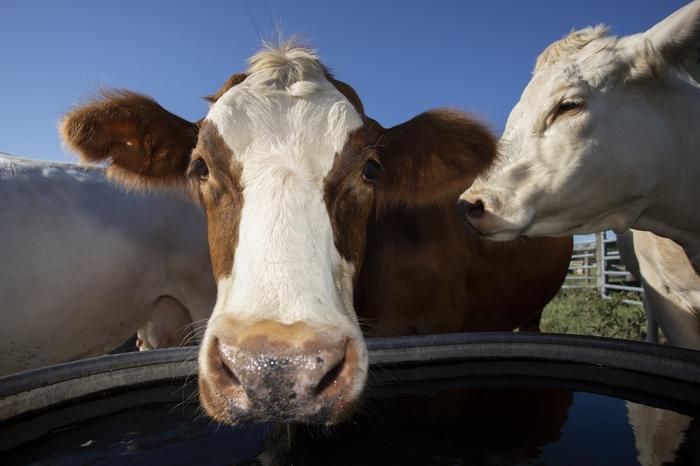University of Florida researchers are spearheading an innovative approach to dairy cattle nutrition that promises to address two critical challenges faced by the agricultural sector today: reducing greenhouse gas emissions and enhancing the efficiency of milk production. This pioneering study explores the use of a novel feed supplement comprised of flaxseed and pea protein, designed to mitigate methane emissions from cows while simultaneously optimizing nutrient absorption. In the context of escalating concerns about climate change and food security, such advancements have far-reaching implications for sustainable livestock farming.
Methane (CH₄) is a potent greenhouse gas with a global warming potential many times greater than carbon dioxide over a 20-year timeframe. One of the largest natural anthropogenic sources of methane emissions is ruminant livestock, particularly dairy cows, whose digestive processes generate methane during enteric fermentation. When methane is produced in the rumen, the primary stomach chamber of cattle, it represents an energy loss for the animal—energy that could otherwise be redirected toward productive functions such as milk synthesis. Thus, the dual goals of environmental stewardship and improved animal productivity intersect in the quest to lower enteric methane output.
Led by Dr. Antonio Faciola, Associate Professor in the Department of Animal Sciences at the University of Florida, the research team conducted in vitro experiments investigating how supplementation with a flaxseed and pea protein matrix affects ruminal fermentation dynamics, nutrient degradability, and methane emissions. Flaxseed, rich in omega-3 fatty acids, and pea protein, a high-quality plant-based protein, were combined to create a feed additive hypothesized to modulate microbial populations in the rumen and alter fermentation pathways favorably. By fermenting these substrates within a simulated rumen environment, the team evaluated changes in methane generation alongside measures of digestibility.
Methanogenesis, the biochemical process leading to methane production in the rumen, involves specialized archaea known as methanogens that utilize hydrogen and carbon dioxide generated by bacterial fermentation of carbohydrates. Reducing hydrogen availability or redirecting fermentation end-products can suppress methanogen activity. The flaxseed and pea protein supplement was shown to influence the microbial ecosystem by promoting alternative fermentation pathways that decrease hydrogen accumulation and subsequently lower methane synthesis. This metabolic shift not only reduces emissions but can enhance feed energy utilization by preserving substrates otherwise lost as methane.
In the meticulously controlled laboratory setting, the supplement resulted in a statistically significant reduction in methane output compared to control samples. Concurrently, the researchers observed improved degradability of key nutrients, indicating enhanced microbial breakdown of feed components. Such improvements in ruminal fermentation efficiency suggest the potential for increased energy availability to the host animal. The supplementation strategy therefore holds promise for supporting higher milk yields or growth rates without additional feed input, addressing economic and environmental sustainability simultaneously.
Dr. Faciola emphasized the concept of this supplementation as a "win-win" scenario: “Every time we reduce methane emissions, we conserve energy within the cow’s body that can be redirected toward milk production.” This paradigm highlights the synergistic benefits of targeted nutritional interventions that align productivity with climate goals. Incorporating plant-based ingredients like flaxseed and pea protein also aligns with broader trends toward sustainable and alternative feed sources, further reducing reliance on conventional feedstocks that have their own environmental footprints.
Integral to the study’s success was the contribution of James Vinyard, a research assistant professor affiliated with the University of Alaska and a former postdoctoral fellow at the University of Florida. Vinyard’s expertise in simulating ruminal digestion processes in vitro was instrumental in quantifying fermentation changes and methane production with high precision. His work enabled a mechanistic understanding of how the supplement influences rumen microbiota and fermentation dynamics, providing a robust platform for predicting in vivo outcomes.
Looking ahead, the team plans to validate these promising laboratory findings through controlled feeding trials with live dairy cows. Such in vivo studies are critical to assess whether the methane reduction and improved nutrient degradability observed in vitro will translate to measurable benefits under real-world farming conditions. Variables such as animal health, feed intake behavior, milk yield, and overall herd performance will be monitored to evaluate the practical implications of supplement adoption.
Beyond environmental benefits, enhancing the feed efficiency of dairy cows addresses pressing concerns about global food security. With the human population projected to reach nearly 10 billion by 2050, efficiently producing more milk and meat from existing agricultural resources becomes imperative. Dr. Faciola underscored the urgency of these challenges: “We will need to have cows producing more milk with the same amount of food. We have to be more efficient to feed more people.” Innovations like this supplement could thus form a key component of sustainable intensification strategies in animal agriculture.
The study received partial funding from O&T Farms Ltd., a Canadian company specializing in animal feed supplements, underscoring industry interest in scalable solutions to reduce the environmental impact of livestock. The collaboration between academia and industry also facilitates translation of scientific discoveries into commercially viable products with global reach.
In summary, this research represents a notable advancement in sustainable dairy farming, demonstrating how tailored dietary interventions can reduce methane emissions while enhancing animal productivity. By leveraging the unique properties of flaxseed and pea protein, University of Florida scientists have opened new pathways towards environmentally responsible and economically feasible livestock management. As the agricultural sector grapples with climate change imperatives and resource constraints, such innovative strategies will be critical to shaping the future of food production.
Subject of Research: Effects of dietary supplementation with flaxseed and pea protein on ruminal fermentation, nutrient degradability, and methane emissions in dairy cattle.
Article Title: Effects of a flaxseed and pea matrix on in vitro ruminal fermentation, nutrient degradability, and methane emissions
News Publication Date: 10-Apr-2025
Web References:
DOI link
References: Journal of Dairy Science, 10-Apr-2025
Image Credits: UF/IFAS
Keywords: Methane, Climatology, Animal research, Animal science, Environmental methods




